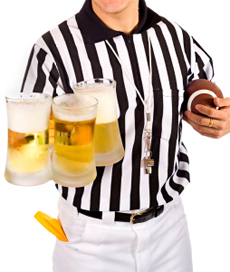Beer Super Bowl
Have A Beer Tasting During The Super Bowl
(Or Any Game)
CAPSULE REPORT: Here’s a new Super Bowl tradition—make your game beers the craft beers of the competing teams’ regions. For our inaugural Beer Bowl, celebrating the competition between the New York Giants and the New England Patriots, we tasted beers from their respective regions. In each quarter, beers competed neck and neck, undergoing intense scrutiny amid the distraction of wrap sandwiches, cassava chips and brownies (beer and chocolate rocks!). The result: We enjoyed the beer more than the commercials.
On Sunday, February 3, the New England Patriots and New York Giants met in Arizona for Super Bowl XLII. During the week leading up to the big game, we here at THE NIBBLE decided to hold a competition of our own. We gathered some of our favorite craft brews from New England, matched them up against some of our favorites from New York, and set out to determine the winners across a number of different beer styles. Thus, Beer Bowl I was born. After sampling and comparing the various beers, we chose the winners by asking ourselves two questions:
- Which beers best represent their respective brewing styles?
- If we were throwing a party for the big game—complete with typical Super Bowl party-style food—which of these beers would we serve?
The short answer to the second question, at least, was: all of them. There were no losers in the bunch. But like the real Super Bowl, there can be no ties in the Beer Bowl. So, we went through the deliciously arduous task of tasting and re-tasting all of these beers to decide which region brews the winningest beers. (It’s a tough life, my friends.)
In the interest of full disclosure, I should point out that all three members of the Beer Bowl tasting panel happen to live in New York.* But when it comes to food and drink, our only allegiance is to finding the very best. So, on Super Bowl Sunday, whether your attention is focused on the game or you tune in just for the commercials, plan to enjoy the competing teams’ regional beers, from kickoff all the way through the seemingly interminable halftime show, and long past the final whistle.
*Myself, wine editor Kris Prasad and editorial director Karen Hochman.
Winter Ale
Blue Point Winter Ale
Patchogue, New York
vs.
Long Trail Hibernator
Bridgewater Corners,
Vermont
Winter ales are traditionally rich and sweet brews. Some taste fruity and spicy, and others are marked by caramel-like flavors of roasted malt. They're usually amber in color, with barely a trace of hop bitterness. Blue Point Winter Ale, with its complex layers of spice and honey-like sweetness, is a classic example of the style. Long Trail Hibernator, by comparison, was lighter in body and flavor. This is most likely due to the wheat malt used in the brew, which also contributed to the beer's pleasantly earthy flavor and its smooth, easy drinkability.
|
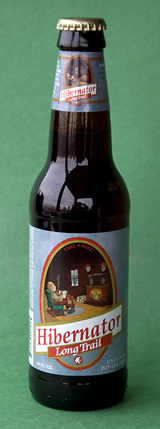
Long Trail Hibernator from
Vermont.
|
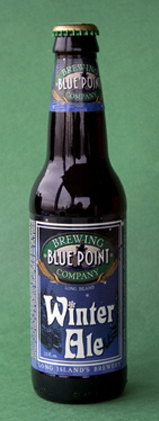
Blue Point Winter Ale from
New York. |
However, the addition of wheat malt also softened the Hibernator’s richness—and richness is essential in a winter ale. Blue Point’s stronger flavors were impossible to ignore. Winter months demand a full-flavored beer to help us enliven our frozen palates. Blue Point Winter Ale is that beer.
|
Winter Ales pair best with rich, full-flavored foods like steak and lamb dishes, barbecue and various strongly-flavored cheeses. Try it with extra-sharp Cheddar.
|
Belgian-Style White Ale
Ommegang Witte
Cooperstown, New York
vs.
Allagash White
Portland, Maine
When we tasted these beers side-by-side, Ommegang came in like a Tom Brady pass: crisp, assertive and direct. The flavors of lemon, orange and coriander hit us right in the numbers (or, in this case, the palate). The Allagash White, by comparison, tasted a bit weaker. I won't go so far as to compare it to one of the wobbly, fluttery, dying-duck passes occasionally thrown by Eli Manning, but the requisite flavors of citrus and spice were still somewhat muted.
|
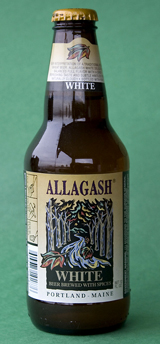
Allagash White from Maine.
|
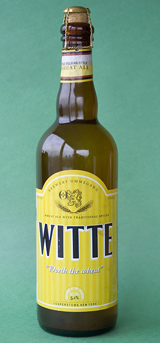
Ommegang Witte from New
York. |
Ommegang, on the other hand, with its tartness and intensely bubbly texture on the tongue, captured the defining characteristics of a white ale (witte means white in Flemish, the language of Belgium). Both are refreshing brews, but Ommegang had greater depth of flavor.
|
Pair this beer with shrimp, grilled fish and other seafood dishes. It also goes well with salads, grilled chicken and most fruit-based desserts. |
Lager
In an effort to reach out to the craft beer market, Anheuser-Busch recently embarked on a massive print and TV ad campaign in which they describe Budweiser as the “Great American Lager.” Never mind that this is a bit like the folks over at McDonald’s attempting to make inroads with the Slow Food movement. If Budweiser is, in fact, the Great American Lager, then we, as a nation, must be suffering from a severe shortage of taste buds. In the lager portion of our Beer Bowl, the two brews that went head to head—Brooklyn Lager and Sam Adams Boston Lager—are far worthier of wearing the crown as America's best.
Both are relative “heavyweights” of the craft brewing world, with devoted followings and worldwide distribution (although the Boston Beer Company’s [makers of Samuel Adams] output of nearly 1.5 million barrels per year dwarfs Brooklyn’s annual yield). With their flavor-first brewing styles, both have done nothing less than redefine what a lager should taste like for millions of once-jaded American beer drinkers. So, how did they match up, head-to-head (no pun intended there, folks)?
Brooklyn Lager
Brooklyn, New York
vs.
Samuel Adams Boston
Lager
Boston, Massachusetts
Sam Adams and Brooklyn both pack their lagers with the floral aroma and flavor of German Noble hops, and they temper the hop bitterness with a sturdy and sweet malt backbone. The similarities end there, however. Brooklyn Lager is also brewed with American Cascade hops, which lent the distinctively citrusy and spicy hop flavors that gave it the edge in our taste test. The hop flavors are further enhanced during brewing by a process called dry hopping, which the brewery’s website describes as “the centuries-old practice of steeping the beer with fresh hops as it undergoes a long, cold maturation.”
|
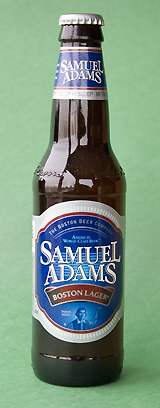 Samuel Adams from Boston. Samuel Adams from Boston.
|
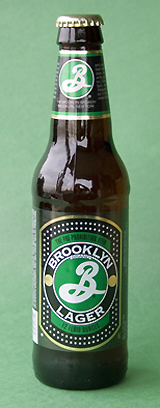
Brooklyn Lager from New York. |
This extra step pays dividends in terms of the lager's depth of flavor. And, while the hops were what first stood out when we sampled the brew, Brooklyn Lager's caramel malt sweetness provided balance and ensured that the hops were not all that we tasted.
Hoppy bitterness was less evident in the Sam Adams, and it tasted too sweet and even somewhat watery—like a mass-produced brew crafted to appeal to, well, the masses. And it is, of course, a mass-produced brew. Their output of 1.5 million barrels per year doesn’t come close to that of the world’s brewing giants (Anheuser-Busch, for example, produced nearly 125 million barrels in 2006), but it makes Sam Adams the largest craft brewery in the country. While its flavor and depth are many degrees more intense than beers like Budweiser, it tasted like Sam Adams has muted some of the unique flavors—the outsized hoppiness and subtle malt sweetness—that were once their hallmarks. Sam Adams Lager is a dependable and solid brew, but it tastes like the brewers are playing it safe. Brooklyn, on the other hand, is not. Craft beer fans demand bold flavors, and Brooklyn Lager delivers.
|
Brooklyn Lager is a versatile beer that pairs well with just about any food. Its hoppiness helps it to stand up to spicy foods such as Buffalo wings, Mexican food and chili. It’s a perfect match for pizza, and it also goes well with smoked or grilled meats. |
India Pale Ale
Saranac India Pale Ale
Utica, New York
vs.
Harpoon IPA
Boston, Massachusetts and
Windsor, Vermont
American IPAs tend to be explosively, aggressively hoppy. For some, this hyper-hoppiness can be a deterrent. For others, hoppiness is happiness. I tend to lean toward the latter category. Harpoon IPA, brewed in both Massachusetts and Vermont, is not an overwhelmingly bitter beer, but the hop flavors are impossible to ignore. Like Brooklyn Lager, Harpoon IPA is dry-hopped, and the addition of fresh hops during the brewing process not only enhances the beer’s pleasantly bitter aroma and flavor, but also helps to bring the hop flavors to the forefront of the brew—which is right where they belong in an American IPA.
|
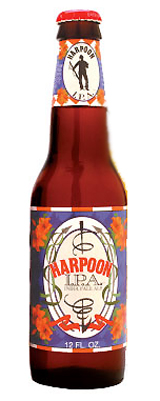
Harpoon IPA from
Massachusetts & Vermont.
|
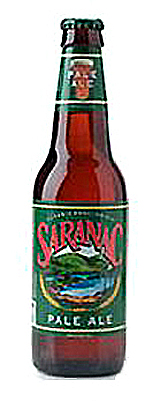
Saranac IPA from New York. |
Saranac IPA, by comparison, was a sweeter, maltier brew that lacked the hop bite that I look for in an IPA. The Harpoon was far crisper, with only a touch of sweetness to help round out the beer’s flavors.
|
India Pale Ales are perfect matches for the spicy foods of Thailand, Vietnam and India. They also pair well with wings and chili. IPAs also go well with aged cheeses. |
Beer Bowl I final score: New York 3, New England 1
So does this mean that New York brews better beer than New England? Of course not. We tasted only a small sampling of beers from each area. But of those we tasted, the beers from New York reigned supreme.
And did New York’s victory in Beer Bowl I portend the Giants’ stunning upset over the heavily-favored Patriots in this year’s Super Bowl? We’ll never know... but we’re willing to test that theory during next year’s Super Bowl. Stay tuned.
|


